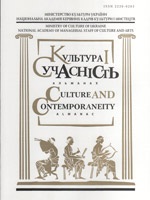Mentally identifiable values in the conditions of globalization transformations
DOI:
https://doi.org/10.32461/2226-0285.1.2019.179688Keywords:
culture, globalization, intercultural dialogue, homogenized culture, ethnocultural values, mental values, national and cultural identityAbstract
The purpose of the research is to analyze the role of mental values as national and cultural identifiers in the dynamics of globalization processes of our time. The methodology of work involves the use of culturological, axiological methods to clarify the essence of mental values in the context of globalization issues; analytical - for the study of the globalization processes taking into account the various directional refraction vectors in accordance with the ethno-national environment. Scientific novelty is that for the first time the category of mental-identifying values as a marker of national-cultural-identical in the conditions of homalization, which determine the core of the identification ethno-cultural model, is distinguished. Conclusions. As a result of the study, it was discovered that the spiritual and spiritual values of peoples should not compete with the newest values that are determined by technologized and universalized cultural models, and cultural patterns that are apocryphalized by a globalized cultural context should not "erode" ethnonational values and cultural identities formed on their basis . Homogeneous culture today is an equal participant in the dialogue of cultures. The work of the state on the principles of fostering a friendly attitude towards other cultures, the development of various forms of intercultural exchange, but a mandatory condition for the preservation of ethno-national identity and cultural specificity in the conditions of globalization transformation should be directed at solving problems of forming the foundations of cultural dialogue and tolerance. It should also be borne in mind that for many representatives of the ethnic majority, the recognition of the rights of socio-cultural minorities also becomes a problem of value choice.References
Бодрийяр Ж. Америка / пер. с франц. Д. Калугин. СПб: Владимир Даль, 2000. 206 с.
Диалог цивилизаций. Повестка дня. Горбачев-Фонд / Сос ти общ. ред. М. : ИФ РАН, 2005. 145 с.
Кастельс М. Информационная эпоха: экономика, общество, культура. М.: ГУ ВШЭ, 2000. 607 с.
Ким О.В. Теория модернизации: между европоцентризмом и «множеством модерностей». Вестник Томсого государственного университета. История. 2012. ғ1. С.89-94.
Ковальова Г.П. Національна ідентичність та її формування в незалежній Україні в умовах глобалі- зації: культурологічні проблеми: автореф. дис. … канд культурології. Х., 2010. 23 с.
Кримський С. Запити філософських смислів. К.: Видавець ПАРАПАН, 2003. 240 с.
Козловець М.А. Феномен національної ідентичності: виклики глобалізації: монографія. Житоми: Вид-во ЖДУ ім. І.Франка, 2009. 558 с.
Сорокин П.А. Человек. Цивилизация. Общество. М.: Политиздат, 1992. 543 с.
Bodriyyar, Zh. (2000). America. (D. Kalugin, Trans). Saint Petersburg: Vladimir Dal [in Russian].
Dialogue of civilizations. Agenda. Gorbachev-Fund. (2005) Moscow: IF RAN [in Russian].
Kastels, M. (2000). Information Age: economy, society, culture. Moscow: GU VShE [in Ukrainian].
Kim, O.V. (2012). Theory of Modernization: Between Eurocentricism and the ―Many Modernities‖. Vest- nik of Toms State University. History, 1 [in Russian].
Kovaljova, G.P. (2010). National identity and its formation in an independent Ukraine in the conditions of globalization: cultural problems. Extended abstract of candidate‘s thesis. X. [in Ukrainian].
Krymsjkyj, S. (2003). Requests for philosophical meanings. Kyiv: Publisher PARAPAN. [in Ukrainian].
Kozlovecj, M.A. (2009). The phenomenon of national identity: the challenges of globalization: monograph. Zhytomy: Publisher ZhDU im. I.Franka [in Ukrainian].
Sorokin, P.A. (1992). Person. Civilization. Society. Moscow: Politizdat [in Russian].
Downloads
Published
Issue
Section
License

This work is licensed under a Creative Commons Attribution 4.0 International License.
Authors who publish with this journal agree to the following terms:
- Authors retain copyright and grant the journal right of first publication with the work simultaneously licensed under a Creative Commons Attribution License that allows others to share the work with an acknowledgement of the work's authorship and initial publication in this journal.
- Authors are able to enter into separate, additional contractual arrangements for the non-exclusive distribution of the journal's published version of the work (e.g., post it to an institutional repository or publish it in a book), with an acknowledgement of its initial publication in this journal.
- Authors are permitted and encouraged to post their work online (e.g., in institutional repositories or on their website) prior to and during the submission process, as it can lead to productive exchanges, as well as earlier and greater citation of published work (See The Effect of Open Access).


